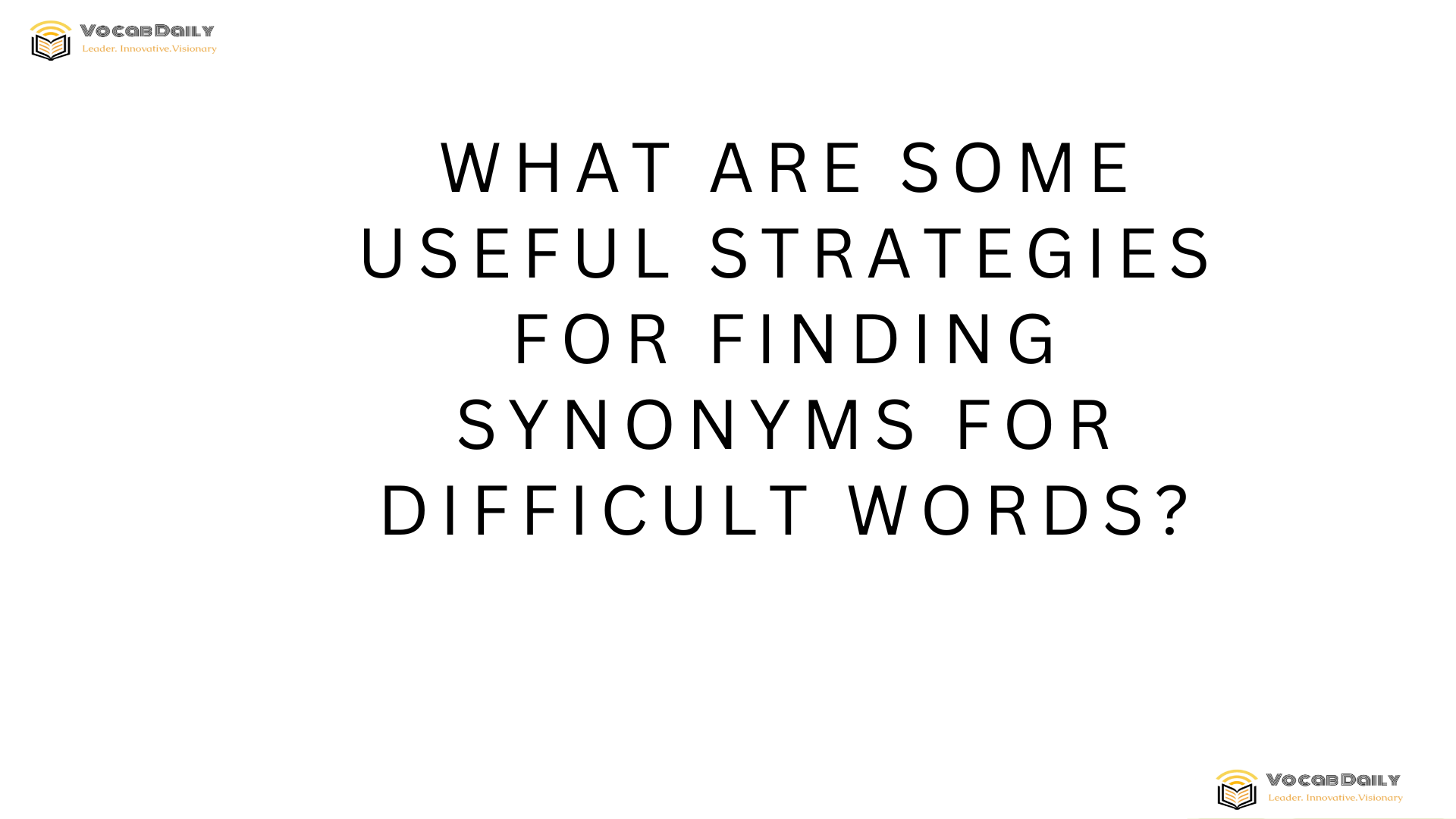What are some useful strategies for finding synonyms for difficult words
Using a Thesaurus Effectively
A thesaurus is one of the most straightforward tools to find synonyms for difficult words. Unlike a standard dictionary that provides definitions, a thesaurus focuses on listing words with similar meanings. When using a thesaurus, it is important to consider the context of the word you want to replace. Many synonyms have subtle differences in tone, formality, or connotation. For example, the words “happy,” “content,” and “elated” all mean cheerful, but they vary in intensity. By carefully selecting the appropriate synonym from a thesaurus, you can maintain accuracy and nuance in your writing.
Contextual Analysis for Word Replacement
Understanding the context in which a word is used is crucial when searching for synonyms. A difficult word often has multiple meanings, depending on the sentence or phrase it appears in. One effective strategy is to analyze the sentence’s overall tone, subject matter, and audience before selecting a synonym. Ask yourself: Is the tone formal or informal? Is the word used in a technical or casual setting? Answering these questions can help narrow down the list of suitable alternatives. Additionally, reading the sentence aloud may reveal which synonym feels most natural.
Leveraging Online Synonym Tools
Today, there are numerous online resources designed to assist with finding synonyms quickly and accurately. Tools like Thesaurus.com, Power Thesaurus, and Synonym.com allow users to enter challenging words and receive extensive lists of related synonyms. Many of these platforms include user votes or examples of usage, making it easier to evaluate suitability. Some tools also provide antonyms, idioms, and phrases, expanding the options available. Users should cross-reference these suggestions with a dictionary to ensure the synonym’s precise meaning aligns with the intended use.
Utilizing Vocabulary Apps and Extensions
Vocabulary apps and browser extensions are especially useful for writers who want instant access to synonyms. Applications like Grammarly, ProWritingAid, and Microsoft Editor often recommend synonyms in real-time while you type. These tools not only suggest alternatives but also highlight possible improvements in sentence structure and tone. Many apps come with customizable options allowing users to filter recommendations based on formality or simplicity. Integrating these tools into everyday writing routines can gradually enhance vocabulary knowledge while making the search for synonyms more efficient.
Reading Widely and Taking Notes
One of the most enriching ways to find synonyms naturally is through extensive reading across various genres and subjects. Encountering words in different contexts helps build a mental database of synonyms and their appropriate usage. As you read, it is helpful to jot down unfamiliar words along with their synonyms or definitions. Keeping a dedicated vocabulary journal or digital note can serve as a quick reference in the future. This method promotes deeper understanding of word meanings and practical application rather than relying solely on external tools.
Using Word Roots and Prefixes to Expand Options
Investigating the roots, prefixes, and suffixes of difficult words can open up alternative synonyms. Many English words derive from Latin or Greek origins, and recognizing common components can help you find similar words in the same family. For instance, the root “bene-” means good, so “beneficial,” “benevolent,” and “benign” share positive connotations. This approach not only assists with finding synonyms but also deepens understanding of word construction. Using this linguistic insight, you can guess the meanings of new words and related synonyms with more confidence.
Asking for Help from Language Communities
Language forums and communities, such as Reddit’s r/EnglishLearning or dedicated Facebook groups, offer opportunities to seek advice from native speakers and language enthusiasts. Posting a difficult word along with context can generate diverse suggestions for synonyms. Community members often provide explanations for their choices that highlight subtle nuances. Engaging with these groups can also expose you to idiomatic expressions or phrases that serve as alternatives to single words, enriching your writing style. Always remember to reciprocate by sharing your knowledge when possible.
Incorporating Synonym Practice in Daily Writing
To become more adept at using synonyms, regular practice is essential. Try rewriting paragraphs or essays by replacing difficult words with suitable synonyms. This exercise helps in testing your understanding and assessing the impact on tone and clarity. Additionally, language workout apps and websites offer challenges designed to build synonym skills through quizzes and interactive tasks. Over time, repetitive practice aids in internalizing a variety of synonyms, making it easier to select them intuitively during everyday writing.
Balancing Simplicity and Sophistication
When finding synonyms, it is important to balance the desire to use sophisticated words with the need for clear communication. Sometimes, selecting a simpler synonym increases accessibility and reader engagement. On the other hand, a more precise or formal word might be necessary for academic or professional writing. Before finalizing a synonym, consider your target audience’s likely vocabulary and the overall purpose of your text. This awareness ensures that the synonym enhances rather than hinders understanding.
Using Synonym Lists and Flashcards
Creating personalized synonym lists and flashcards is an effective memorization technique. You can group words by themes such as emotion, action, or description, which helps to organize your vocabulary systematically. Flashcards can be physical or digital, using apps like Anki or Quizlet. Regularly reviewing these cards supports long-term retention and quick recall. Over time, this method builds a robust and versatile vocabulary toolkit that you can draw upon when faced with difficult words.
Practicing with Synonym Replacement Games
Games designed around synonym replacement can make the learning process engaging and enjoyable. Activities like word matching, synonym puzzles, or timed challenges encourage active participation in vocabulary building. Some educational websites provide free games focusing on synonyms and antonyms, suitable for learners of all ages. Participating in such games regularly sharpens your ability to think of synonyms spontaneously, improving both written and spoken language skills.
Also check out VocabDaily workbook collections.

Leave a Reply